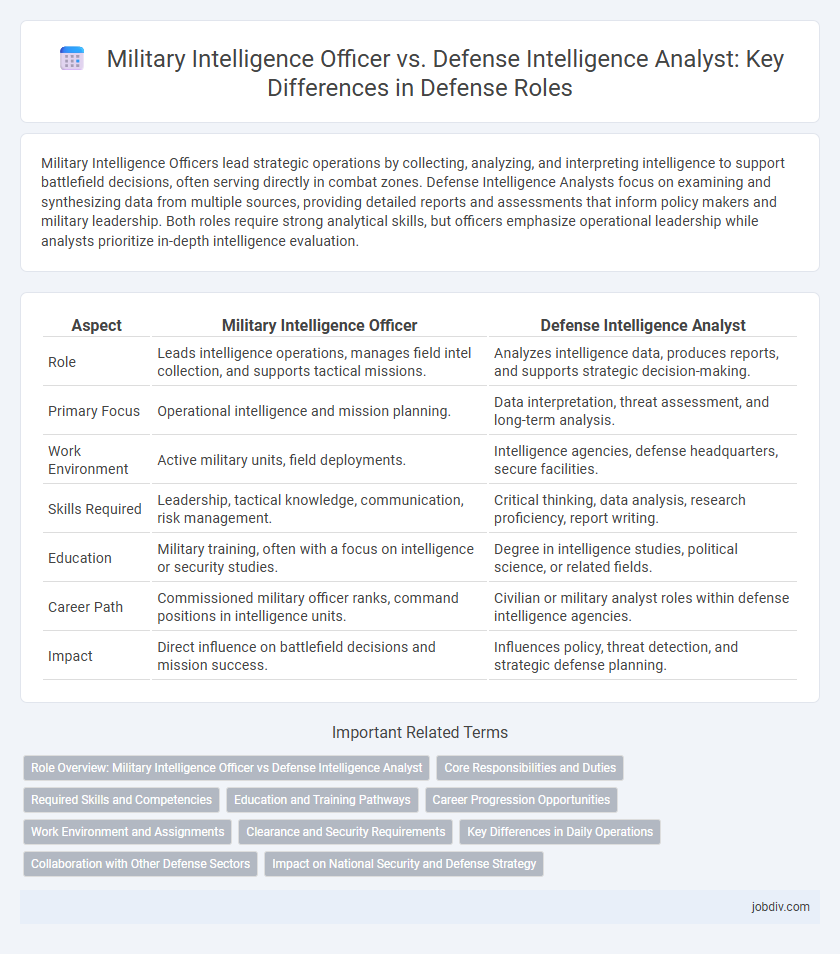Military Intelligence Officers lead strategic operations by collecting, analyzing, and interpreting intelligence to support battlefield decisions, often serving directly in combat zones. Defense Intelligence Analysts focus on examining and synthesizing data from multiple sources, providing detailed reports and assessments that inform policy makers and military leadership. Both roles require strong analytical skills, but officers emphasize operational leadership while analysts prioritize in-depth intelligence evaluation.
Table of Comparison
| Aspect | Military Intelligence Officer | Defense Intelligence Analyst |
|---|---|---|
| Role | Leads intelligence operations, manages field intel collection, and supports tactical missions. | Analyzes intelligence data, produces reports, and supports strategic decision-making. |
| Primary Focus | Operational intelligence and mission planning. | Data interpretation, threat assessment, and long-term analysis. |
| Work Environment | Active military units, field deployments. | Intelligence agencies, defense headquarters, secure facilities. |
| Skills Required | Leadership, tactical knowledge, communication, risk management. | Critical thinking, data analysis, research proficiency, report writing. |
| Education | Military training, often with a focus on intelligence or security studies. | Degree in intelligence studies, political science, or related fields. |
| Career Path | Commissioned military officer ranks, command positions in intelligence units. | Civilian or military analyst roles within defense intelligence agencies. |
| Impact | Direct influence on battlefield decisions and mission success. | Influences policy, threat detection, and strategic defense planning. |
Role Overview: Military Intelligence Officer vs Defense Intelligence Analyst
Military Intelligence Officers lead strategic intelligence operations, manage field intelligence assets, and provide critical battlefield decision support to military commanders. Defense Intelligence Analysts collect, evaluate, and interpret classified information from multiple sources to produce actionable intelligence reports for defense policymakers. Both roles contribute to national security, with Military Intelligence Officers focusing on operational execution and Defense Intelligence Analysts emphasizing analytical assessment.
Core Responsibilities and Duties
Military Intelligence Officers lead the collection, analysis, and dissemination of actionable intelligence to support military operations and strategic planning. Defense Intelligence Analysts conduct in-depth assessments of classified data to evaluate threats, identify enemy capabilities, and produce intelligence reports that inform defense policies. Both roles demand expertise in data interpretation, threat analysis, and coordination with other defense units to enhance situational awareness and operational effectiveness.
Required Skills and Competencies
A Military Intelligence Officer requires leadership abilities, strong analytical thinking, and expertise in tactical operations to manage intelligence units effectively. Defense Intelligence Analysts must excel in critical thinking, data interpretation, and proficiency with intelligence software to evaluate threats and provide actionable insights. Both roles demand advanced communication skills, problem-solving capabilities, and a deep understanding of geopolitical dynamics and security protocols.
Education and Training Pathways
Military Intelligence Officers typically undergo rigorous training through military academies or officer candidate schools, supplemented by specialized intelligence courses and leadership development programs. Defense Intelligence Analysts often possess advanced degrees in fields such as international relations, political science, or cybersecurity, and receive training in data analysis, threat assessment, and intelligence technologies. Both roles require continuous professional education to stay current with evolving intelligence methodologies and security protocols.
Career Progression Opportunities
Military Intelligence Officers typically experience structured career progression through ranks with increasing leadership responsibilities and command roles within intelligence units. Defense Intelligence Analysts often advance by deepening expertise in data analysis, strategic assessment, and interagency collaboration, potentially moving into senior advisory or specialized intelligence roles. Both career paths offer opportunities for advanced training and education, enhancing prospects for higher-level positions within military and defense intelligence organizations.
Work Environment and Assignments
Military Intelligence Officers operate primarily within military bases, command centers, and deployed environments, often engaging directly with tactical units in high-pressure, mission-critical settings. Defense Intelligence Analysts typically work in secure government facilities or intelligence agencies, analyzing vast data sets to produce strategic assessments that inform defense policies and operations. While officers experience dynamic, field-based assignments requiring real-time decision-making, analysts focus on long-term intelligence evaluation and forecasting within controlled office environments.
Clearance and Security Requirements
Military Intelligence Officers typically require Top Secret security clearance with access to Sensitive Compartmented Information (SCI) to conduct field operations and lead intelligence units. Defense Intelligence Analysts also hold Top Secret clearance, often with SCI access, but their roles focus on processing and interpreting intelligence data for strategic decision-making. Both positions demand rigorous background investigations, polygraph examinations, and ongoing security training to maintain clearance eligibility within defense intelligence agencies.
Key Differences in Daily Operations
Military Intelligence Officers lead the collection and analysis of strategic information, coordinating field operations and managing intelligence teams in real-time conflict environments. Defense Intelligence Analysts primarily focus on interpreting raw data from various sources, producing detailed reports and assessments that support decision-making at higher command levels. The key difference lies in Officers engaging directly with operational planning and personnel management, while Analysts concentrate on data evaluation and intelligence synthesis.
Collaboration with Other Defense Sectors
Military Intelligence Officers and Defense Intelligence Analysts both play critical roles in collaborating with other defense sectors by sharing actionable intelligence and coordinating joint operations. Military Intelligence Officers typically liaise directly with field units and commanders to ensure real-time intelligence supports tactical decisions, while Defense Intelligence Analysts focus on synthesizing data from multiple sources to provide strategic assessments for defense planning. Effective collaboration between these professionals enhances situational awareness and strengthens overall defense readiness across military branches and allied agencies.
Impact on National Security and Defense Strategy
Military Intelligence Officers directly influence national security by leading intelligence operations, collecting battlefield data, and providing actionable insights to military commanders, which shapes immediate defense strategies. Defense Intelligence Analysts analyze large volumes of intelligence data to identify threats, forecast adversary actions, and support long-term strategic planning, ensuring informed decision-making at the policy level. Both roles are critical in maintaining situational awareness and enhancing the effectiveness of national defense capabilities.
Military Intelligence Officer vs Defense Intelligence Analyst Infographic

 jobdiv.com
jobdiv.com